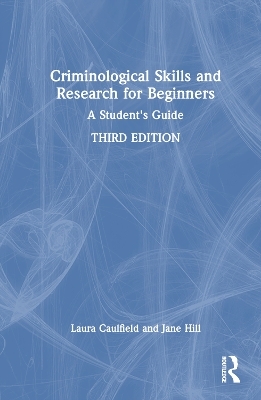
Criminological Skills and Research for Beginners
Routledge (Verlag)
978-1-032-64563-6 (ISBN)
- Noch nicht erschienen (ca. Februar 2025)
- Versandkostenfrei innerhalb Deutschlands
- Auch auf Rechnung
- Verfügbarkeit in der Filiale vor Ort prüfen
- Artikel merken
This book presents:
• an examination of the theoretical, political and ethical debates in criminological research;
• a complete guide to planning criminological research, assisting student researchers in identifying their research questions, choosing their research methods and critiquing the available literature;
• guidance on the practicalities and processes of collecting data;
• contemporary examples and case studies;
• a discussion of the process of analysing data and writing up research.
New to the third edition is a brand-new chapter on using online and social media data sources. This edition also includes new coverage of mixed-methods approaches, preparing a research proposal, a spotlight on researcher well-being, and guidance on writing reflective essays.
Including an extensive glossary and online support material with extra examples, exercises and videos to further develop students’ understanding, this book is essential reading for any undergraduate on a Criminological Research Methods or Research Skills course, or for anyone in need of practical guidance on any or all of the various stages involved in conducting thorough and effective criminological research.
Laura Caulfield is Professor and Chair of the Institute for Community Research and Development at the University of Wolverhampton, UK. Jane Hill was the Programme Director for the Criminology BA at Birmingham City University, UK, before her retirement in 2012.
List of Figures
List of Tables
List of Boxes
Visual Tour (How to use this book)
Part One, Study Skills for Criminology Students
1. Writing Skills and Essay Writing
2. Referencing
3. Revision Skills and Examination Techniques
4. Presentation Skills
Part Two, The Importance of Criminological Research
5. The context of criminological research: power, knowledge, politics, and values
6. The significance of criminological research: understanding the philosophical roots of our claims to know about crime in society
7. The ethics of criminological research
Part Three, Getting Going with Criminological Research
8. Planning: Where do research ideas come from? How do we ‘fine tune’ them?
9. Critiquing the literature and the process of writing your formal review
10. Theories, methods, and their relationships to theories of knowledge
11. Preparing for the practical challenges of real-world crime research
Part Four, Doing Criminological Research: Data Collection
12. Qualitative approaches to research
13. Questionnaires and surveys
14. Using documentary and secondary data sources
15. Using online and social media data sources
Part Five, Doing Criminological Research: Analysis and writing-up
16. Analysing the data: Quantitative analysis
17. Analysing the data: Qualitative analysis
18. Analysing the data: Documents, texts, and other data
19. Writing-up criminological research
Index
| Erscheint lt. Verlag | 28.2.2025 |
|---|---|
| Zusatzinfo | 19 Tables, color; 12 Line drawings, color; 39 Halftones, black and white; 12 Illustrations, color; 39 Illustrations, black and white |
| Verlagsort | London |
| Sprache | englisch |
| Maße | 156 x 234 mm |
| Themenwelt | Recht / Steuern ► EU / Internationales Recht |
| Recht / Steuern ► Strafrecht ► Kriminologie | |
| ISBN-10 | 1-032-64563-6 / 1032645636 |
| ISBN-13 | 978-1-032-64563-6 / 9781032645636 |
| Zustand | Neuware |
| Haben Sie eine Frage zum Produkt? |
aus dem Bereich


